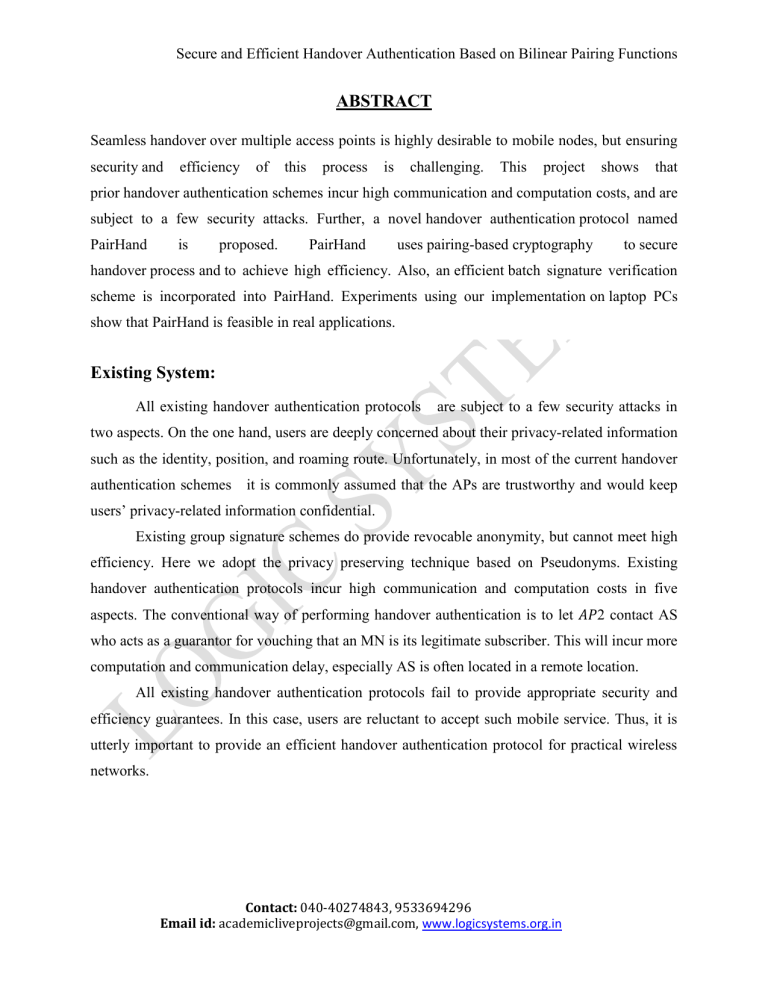abstract - Logic Systems

Secure and Efficient Handover Authentication Based on Bilinear Pairing Functions
ABSTRACT
Seamless handover over multiple access points is highly desirable to mobile nodes, but ensuring security and efficiency of this process is challenging. This project shows that prior handover authentication schemes incur high communication and computation costs, and are subject to a few security attacks. Further, a novel handover authentication protocol named
PairHand is proposed. PairHand uses pairing-based cryptography to secure handover process and to achieve high efficiency. Also, an efficient batch signature verification scheme is incorporated into PairHand. Experiments using our implementation on laptop PCs show that PairHand is feasible in real applications.
Existing System:
All existing handover authentication protocols are subject to a few security attacks in two aspects. On the one hand, users are deeply concerned about their privacy-related information such as the identity, position, and roaming route. Unfortunately, in most of the current handover authentication schemes it is commonly assumed that the APs are trustworthy and would keep users’ privacy-related information confidential.
Existing group signature schemes do provide revocable anonymity, but cannot meet high efficiency. Here we adopt the privacy preserving technique based on Pseudonyms. Existing handover authentication protocols incur high communication and computation costs in five aspects. The conventional way of performing handover authentication is to let 𝐴𝑃 2 contact AS who acts as a guarantor for vouching that an MN is its legitimate subscriber. This will incur more computation and communication delay, especially AS is often located in a remote location.
All existing handover authentication protocols fail to provide appropriate security and efficiency guarantees. In this case, users are reluctant to accept such mobile service. Thus, it is utterly important to provide an efficient handover authentication protocol for practical wireless networks.
Contact: 040-40274843, 9533694296
Email id: academicliveprojects@gmail.com, www.logicsystems.org.in
Secure and Efficient Handover Authentication Based on Bilinear Pairing Functions
Introduction
Wireless internet access services are offered through interconnected mobile telecommunication networks, WLANs, vehicular ad hoc networks. To overcome the geographical coverage limit of each access point and provide seamless access service for mobile nodes, it is important to have an efficient handover protocol. One important module in the handover protocol is authentication. Regardless of the technology implemented, a typical handover authentication scenario involves three entities: mobile nodes , access points (APs) and the authentication server (AS). Before entering the network, an MN registers to AS, then subscribes services and connects to an AP for accessing the network. When the MN moves from the current AP (e.g., 𝐴𝑃 1) into a new AP (e.g., 𝐴𝑃 2), handover authentication should be performed at 𝐴𝑃 2. Through handover authentication, AP2 authenticates the MN to identify and reject any access request by an unauthorized user. At the same time, a session key should be established between the MN and 𝐴𝑃 2 to provide confidentiality and integrity of the communication session. TA deploys RSUs and registers vehicles by granting the corresponding authentication keys. Each RSU receives and then verifies the traffic safety messages from the
OBUs.
Designing a handover authentication protocol is not an easy task. Generally, there are two major practical issues challenging the design. First, efficiency needs to be considered. An MN is generally constrained in terms of power and processing capability. Therefore, a handover authentication process should be computationally efficient. Further, such a process should be fast enough to maintain persistent connectivity for MNs.
Second, security and privacy are serious concerns for the handover authentication service. However, all existing handover authentication protocols are subject to a few security attacks in two aspects. On the one hand, users are deeply concerned about their privacy-related information such as the identity, position, and roaming route.
A novel handover authentication protocol called PairHand , which uses pairing based cryptography to secure handover process and to reduce the communication and computation overheads of the involved entities. Also, it only requires two handshakes between an MN and an
AP, and does not need to transmit or verify any certificate as in traditional public key
Contact: 040-40274843, 9533694296
Email id: academicliveprojects@gmail.com, www.logicsystems.org.in
Secure and Efficient Handover Authentication Based on Bilinear Pairing Functions cryptosystems. Further, we introduce an efficient batch signature verification scheme, in which each AP can simultaneously verify multiple received signatures.
Proposed System:
In this project, a novel handover authentication protocol named PairHand is proposed.
This project shows that prior handover authentication schemes incur high communication and computation costs, and are subject to a few security attacks.
In this project, we propose a novel handover authentication protocol called PairHand, which uses pairing based cryptography to secure handover process and to reduce the communication and computation overheads of the involved entities.
Also, it only requires two handshakes between an MN and an AP, and does not need to transmit or verify any certificate as in traditional public key cryptosystems. Further, we introduce an efficient batch signature verification scheme, in which each AP can simultaneously verify multiple received signatures.
PairHand uses pairing-based cryptography to secure handover process and to achieve high efficiency. Also, an efficient batch signature verification scheme is incorporated into
PairHand.
Module List
Login
Request Server
Handover Authentication:
Batch Authentication:
Traffic-Aware Dynamic Routing:
Pair hand
Contact: 040-40274843, 9533694296
Email id: academicliveprojects@gmail.com, www.logicsystems.org.in
Secure and Efficient Handover Authentication Based on Bilinear Pairing Functions
Module Description
1.
Login:
In this module the user can get in to the system by enter the username and password. The user can register them self in the particular Access pointer (AP). Therefore we can easily identify a Mobile Node (MN), where it is resident.
2.
Request Server:
If the client or a Mobile Node (MN) gets in to the system once, it may access the server through Access pointer (AP). The MN can request any process from the server such download, verify, etc.
3.
Handover Authentication:
The handover authentication process takes place, when the AP receives a new
MN. The AP sends a private key to MN and the MN will respond with message and signature. The AP verifies the signature for authentication.
4.
Batch Authentication:
The batch authentication is the process of verifying information, which is received from the MN to previous AP where MN resident. The authenticated information is checked between the MN and previous AP in new AP. If the authentication is correct, it will allow the MN to continue their status from the server.
5.
Traffic-Aware Dynamic Routing:
When the n number of packets moves towards the AP parallel, there the traffic may occur. To avoid the traffic during communication establishment the traffic awaredynamic routing technique is provide.
6.
Pair hand
Contact: 040-40274843, 9533694296
Email id: academicliveprojects@gmail.com, www.logicsystems.org.in
Secure and Efficient Handover Authentication Based on Bilinear Pairing Functions
A novel handover authentication protocol called PairHand , which uses pairing based cryptography to secure handover process and to reduce the communication and computation overheads of the involved entities. Also, it only requires two handshakes between an MN and an AP, and does not need to transmit or verify any certificate as in traditional public key cryptosystems. Further, we introduce an efficient batch signature verification scheme, in which each AP can simultaneously verify multiple received signatures.
System Requirement Specification:
Software Requirements:
Front End/GUI Tool : Microsoft Visual studio 2008
: Windows family
: C#.NET
Operating System
Language
Hardware Requirements:
Processor
RAM
Hard Disk Drive
Monitor
: Pentium dual core
: 1 GB
: 80 GB
: 17” Color Monitor
Contact: 040-40274843, 9533694296
Email id: academicliveprojects@gmail.com, www.logicsystems.org.in







